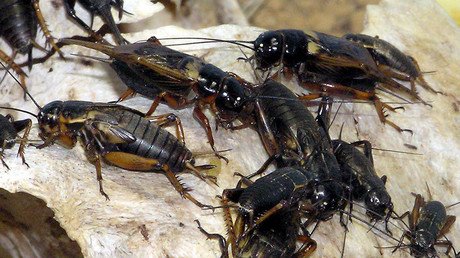‘Tastes like chicken’: Swiss supermarket to sell ‘bug burgers’ following loosening of food laws

Switzerland is renowned for its fondue and chocolate, but a more adventurous culinary offering will soon be available on supermarket shelves. Food giant Coop will begin selling insect-based dishes including “bug burgers” and “bug meatballs” next spring.
Wir arbeiten mit @essentofoods an den ersten Produkten auf Insekten-Basis - wie leckere Burger oder Hackbällchen. https://t.co/zAh68BVswfpic.twitter.com/BcYDwuOsxs
— Coop (@coop_ch) December 16, 2016
Coop and other Swiss grocery stores have long been prevented from selling unusual foods – including those involving insects – without special authorization. But when the federal food safety office (BLV) announced on Friday that it would be loosening its rules, Coop was quick to express its readiness to offer customers the chance to “discover a new world of flavors.”
The supermarket said in a Friday statement that the sale of insect food products would help it achieve a “modern, forward-looking food industry.”
It hailed the benefits of chowing down on insects, including the “great taste.”
“The taste of locusts is reminiscent of chicken. Flour worms have an aroma close to the nut,” the supermarket wrote in the statement.
It went on to cite health benefits, noting that insects are rich in protein and contain essential vitamins, minerals, and unsaturated fatty acids.
It also spoke of the environmental perks, noting that “rearing insects can be carried out in a perfectly sustainable manner.”
Coop’s statement comes after BLV announced on Friday that from May 2017, it would allow any food product to be sold commercially as long as it respects food regulations. It cited benefits for consumers, businesses, and trade.
While Coop’s outside-the-box offering may churn the stomachs of many customers, it seems the supermarket is not alone in its desire to offer Western consumers the option of eating insects. More than 25 such startups have been launched in the US and Canada in the past few years, according to Fortune magazine.













